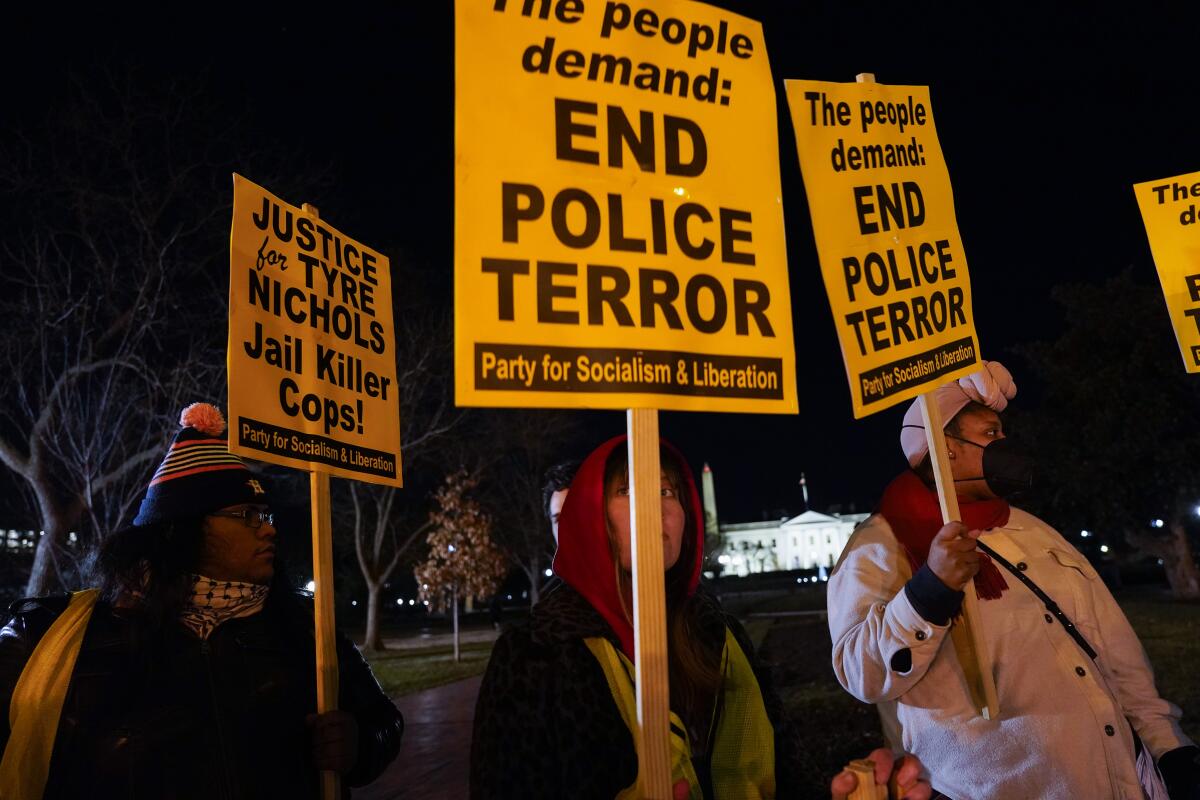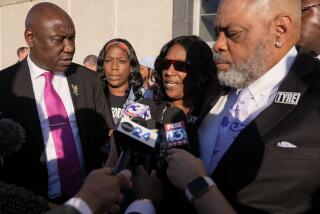Memphis disbands police unit linked to beating death of Tyre Nichols, as protests continue

- Share via
As sporadic crowds continued Saturday to protest the death of Tennessee motorist Tyre Nichols at the hands of law enforcement, the Memphis police chief said she would eliminate the specialized unit implicated in the beating.
The so-called Scorpion unit — officers tasked with targeting violent lawbreakers in high-crime areas — has been inactive since Nichols’ beating and arrest Jan. 7. The five officers fired and charged with second-degree murder in his death belonged to that unit.
Cerelyn “CJ” Davis, the police chief, initially told reporters that she wanted to keep the unit intact and would not scuttle it because a few officers had committed “some egregious act.”
She reversed her decision Saturday, according to a department news release, after meeting with members of the unit and “listening intently to the family of Tyre Nichols, community leaders, and the uninvolved officers who have done quality work in their assignments.”
The remaining officers of the Scorpion unit — which stands for Street Crimes Operations to Restore Peace in Our Neighborhoods — “agree unreservedly with this next step,” the release said. “While the heinous actions of a few casts a cloud of dishonor on the title SCORPION, it is imperative that we, the Memphis Police Department take proactive steps in the healing process for all impacted.”
The announcement came a day after graphic video was released of the incident that fatally injured Nichols, a 29-year-old FedEx worker. The footage stirred outrage and questions, such as why Nichols was stopped in the first place and why medical attention was not given more promptly.
After stopping his car for reasons that remain unclear, police are seen in the footage yanking Nichols from the driver’s seat, using a Taser on him, chasing him, punching him, beating him with a baton and kicking him. More than 20 minutes passed before he received medical attention. Nichols died three days later.
The five officers, who are Black, face charges that could bring them 60 years in prison if convicted.
In Memphis, the large-scale protests that some anticipated after the release of the Nichols video did not materialize. Some stores and restaurants had cut their hours in expectation of unrest, but many were open Saturday morning, as the city began to return to its normal rhythms.
Around 3 p.m. Saturday, roughly 200 protesters gathered under a light rain outside the city’s Public Safety Building. One after another, they took turns with a bullhorn, announcing demands: an end to pretextual stops, the dismantling of a regional gang task force, and the firing of everyone who responded to the scene, including paramedics and firefighters.
Grabbing the bullhorn, JB Smiley Jr., vice chair of the Memphis City Council, urged protesters to attend the council’s next meeting on Feb. 7.
“I’m begging each and every one of you to show up, or as we say in Memphis, pull up,” he said.
Smiley said he had already proposed an ordinance pushing for greater transparency surrounding police use of force and body cameras.
“Memphis has an opportunity to set the standard of how to respond to actions like this,” he said. “We damn sure don’t stand for beating someone down and murdering someone on the streets.”
In a press statement, Smiley also called for the firing of a sixth Memphis police officer who had been on the scene of the Nichols beating, saying the officer had used a Taser on Nichols and “compelled the other officers to stomp him.”
Marching through Memphis, protesters alternately chanted Nichols’ name and sang “We Ready,” a 2002 anthem by the late Atlanta rapper Archie Eversole that has become a mainstay at protests nationwide.
“What they did was not called for at all, period,” said Kevia Palmoore, clutching her 4-year-old daughter’s hand and struggling to keep up with the marchers. She said her real thoughts about the Nichols beating were not fit for publication.
Her fiance, Jyron Byers, said he was upset that the former officers charged with murder in the beating had been allowed to post bail.
Ryan Jackson, 25, said he was sickened by an image of one of the officers lighting a cigarette after the beating. He did not know Nichols, but said he felt a connection as a fellow Black man and skateboarder. He said he was sometimes leery when he saw police at his local skate park.
“I know when they stop and they get to asking questions, they’re gonna make it more than what it is,” he said.
Around 8 p.m. in Hollywood, about 50 demonstrators wearing black obstructed traffic at Sunset Boulevard and Vine Street. They walked west in the middle of Sunset before turning north on Cahuenga Boulevard. One person shattered several glass storefronts with a metal rod while others dropped Bird scooters and parking signs in the road.
On Vine, a person spray-painted “F— Cop City” in red on the facade of a Wells Fargo.
Several people obstructed television crews covering the demonstration, blocking the cameras and shouting into them with bullhorns.
By 8:30 p.m., the group had returned to blocking Sunset and Vine. No police car or officer was in sight.
Jany reported from Memphis, and Ormseth and Goffard from Los Angeles.
More to Read
Sign up for Essential California
The most important California stories and recommendations in your inbox every morning.
You may occasionally receive promotional content from the Los Angeles Times.












